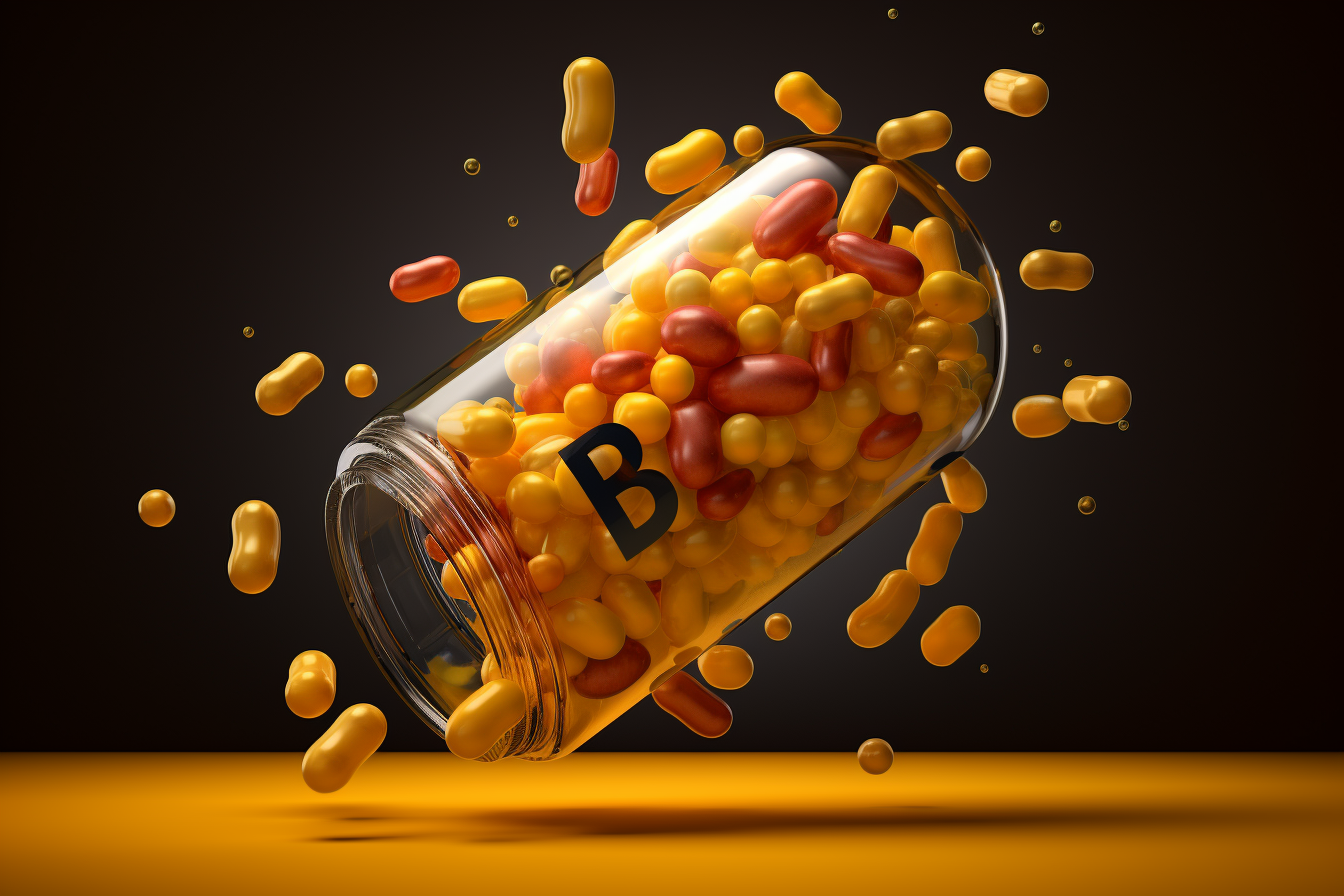As we age, it is not uncommon for our cognitive abilities to begin to decline. However, recent research has suggested that vitamin B supplementation could potentially slow or even prevent this age-related cognitive decline. In this article, we will explore the role of vitamin B in brain health and examine the scientific evidence behind its potential benefits for cognition. From discussing natural sources of vitamin B to delving into clinical trials on its impact on memory and mental processing speed, this article aims to shed light on a simple yet promising solution for maintaining brain function as we get older.
What is Vitamin B and How Does it Work in the Brain?
Vitamin B refers to a group of water-soluble compounds that are essential for optimal health and well-being. There are eight different types of vitamin B, each with its own unique function in the body.

These vitamins play a vital role in energy metabolism and help convert food into fuel for the body’s cells. They also have important functions in maintaining healthy skin, hair, and nails. When it comes to brain health, vitamin B is particularly important as it helps support cognitive processes such as memory, attention span, and processing speed. This is due to its role in promoting healthy neuron growth and development, improving neurotransmitter function, and reducing inflammation.
Studies have shown that supplementation with certain forms of vitamin B can improve cognitive performance in older adults experiencing age-related cognitive decline or mild memory impairment. Such findings suggest that integrating adequate levels of this essential nutrient into our diet may be an effective strategy for maintaining not just physical but also mental health throughout our lives.
The Link Between Vitamin B Deficiency and Cognitive Decline
Cognitive decline is a common concern as we age, and recent research has suggested that vitamin B deficiencies may contribute to this decline. Vitamin B plays an important role in brain health, specifically in the production of neurotransmitters and the maintenance of nerve cell function. Studies have shown that individuals with lower levels of vitamin B12 and other B vitamins have an increased risk for cognitive impairment and dementia.
Fortunately, supplementation with vitamin B may help slow or even prevent age-related cognitive decline. A 2019 clinical trial found that daily intake of a combination of B vitamins (B6, B12, and folic acid) for two years resulted in improved memory performance compared to placebo. Natural sources of vitamin B include meat, fish, dairy products, leafy greens, whole grains and fortified cereals. Increasing dietary intake or considering supplements could potentially benefit brain health over time.
Natural Sources of Vitamin B for Cognitive Health
Natural sources of vitamin B are crucial for cognitive health as they provide the necessary nutrients to support brain functions. Vitamin B12, in particular, plays a critical role in producing neurotransmitters that aid memory and cognition. Some excellent natural sources of this nutrient include fish, meat, dairy products, eggs and fortified cereals.
Another essential vitamin in the B-complex is folate or folic acid. It works together with vitamin B12 to lower homocysteine levels that can potentially increase the risk of dementia. Green leafy vegetables like spinach and kale are among the best food sources of folate alongside lentils and chickpeas.
Other members of the vitamin B family such as thiamin (B1), riboflavin (B2) niacin (B3), pyridoxine (B6) play diverse roles in brain health including energy metabolism regulation and stress response reduction. Together these vitamins make an effective contribution to maintaining cognitive function throughout life by supporting different aspects including mood control, attention span and processing speed.
The Benefits of Vitamin B Supplementation for Memory
The benefits of vitamin B supplementation for memory have been widely studied in recent years. Vitamin B is essential for brain health and plays a key role in cognitive function, particularly in areas such as memory retention and mental processing speed. Studies have suggested that deficiencies in several forms of vitamin B are linked to an increased risk of age-related cognitive decline.
 One potential benefit of vitamin B supplementation is its ability to slow or prevent age-related memory loss. Some clinical trials have shown that taking supplements containing vitamin B can improve both short-term and long-term memory recall in older adults. Additionally, research has indicated that regular intake of vitamin B can boost mental processing speed and reduce the risk of developing certain neurological disorders.
One potential benefit of vitamin B supplementation is its ability to slow or prevent age-related memory loss. Some clinical trials have shown that taking supplements containing vitamin B can improve both short-term and long-term memory recall in older adults. Additionally, research has indicated that regular intake of vitamin B can boost mental processing speed and reduce the risk of developing certain neurological disorders.
Overall, evidence suggests that incorporating vitamin B into your diet through natural sources or supplements could be a simple yet effective way to maintain optimal brain health as you age. However, it is important to consult with your healthcare provider before beginning any new supplement regimen.
How Vitamin B Can Improve Mental Processing Speed
Vitamin B is a group of essential nutrients crucial for brain health and optimal cognitive function. Research has shown that these vitamins, particularly vitamin B12 and folate, may play a significant role in improving mental processing speed. As we age, our brains start to slow down, affecting our attention span and memory recall; however, regular consumption of adequate amounts of B vitamins can sustain healthy brain performance by reducing inflammation levels and preventing oxidative damage.
Numerous studies have proven the power of vitamin B supplementation in enhancing various aspects of cognitive processes such as working memory skills and problem-solving abilities. Additionally, researchers believe that optimizing the intake of these essential micronutrients could prevent neurodegenerative diseases such as Alzheimer’s disease from developing or slowing their progression rates when they arise later on in life. Therefore, incorporating natural sources like whole grains, leafy greens, eggs, fish into one’s diet or taking supplements remains crucial for maintaining optimal levels for proper brain functioning throughout all stages of life.
Clinical Trials on Vitamin B and Age-Related Cognitive Decline
Clinical trials on the role of vitamin B in age-related cognitive decline have shown promising results. In one study, researchers followed subjects over a two-year period, during which some participants received high doses of vitamins B6, B9 (folate), and B12 while others were given placebos. The group receiving vitamin supplementation showed significantly less overall brain volume reduction than those taking placebo pills. Additionally, those supplemented with vitamins B6 and B12 had fewer instances of cognitive decline in certain areas compared to the control group.
Overall, clinical evidence suggests that adequate levels of vitamin B may help protect against age-related cognitive decline. While dietary sources are important for maintaining healthy levels of these nutrients, supplements appear to provide increased benefits when it comes to cognition specifically. Further research is needed to fully understand the extent and conditions under which these benefits occur but many experts recommend adding a multivitamin or individualized vitamin supplement regimen as an additional protective measure against declines in brain health associated with aging.

Recommendations for Incorporating Vitamin B into a Brain-Healthy Diet
As we age, it’s important to consider incorporating vitamin B into our diets to support brain health. Vitamin B plays a crucial role in maintaining cognitive function, including memory and attention. Natural sources of vitamin B include whole grains, leafy greens, eggs, and meat products. However, many adults still struggle to get sufficient quantities through diet alone.
To address this gap, research suggests that supplementation with vitamin B could be an effective solution for improving cognitive performance in older adults. Studies have found that supplementing with specific forms of vitamin B can improve memory recall and processing speed by up to 60%. In some cases, these benefits were observed after just six weeks of daily consumption.
Incorporating proper amounts of all the necessary types of Vitamin Bs such as thiamine (B1), riboflavin (B2), niacin (B3), pantothenic acid (B5), pyridoxine (B6), biotin (B7) folate/folic acid/5-MTHF(B9) and cobalamin(CO-B12) is key when targeting overall brain wellness because each form has specific roles within the body that are essential for optimal functioning both physically and mentally.



 Vitamin B – Brain Health and Cognitive Function
Vitamin B – Brain Health and Cognitive Function
